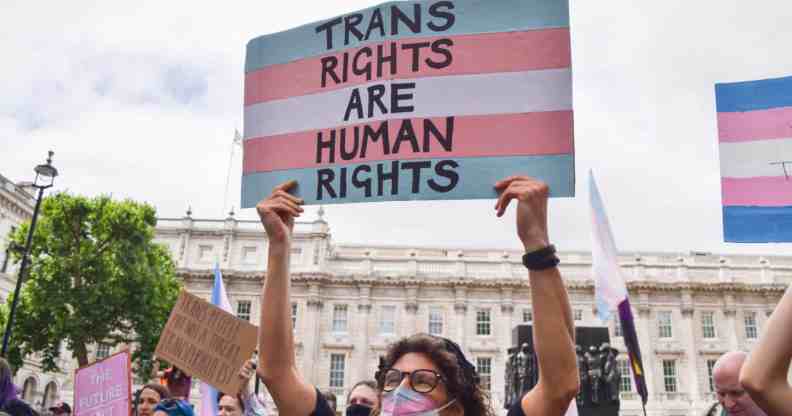World Health Organization stresses ‘importance’ of gender-affirming care for trans people

Trans people are encouraged to use the new map to figure out which states are more trans friendly. (SOPA Images/LightRocket via Getty Images/Vuk Valcic)
The World Health Organisation (WHO), has stressed the “importance” of gender-affirming care and efficient referral to gender clinics for trans people, in a new report.
A Journal of the International AIDS Society report, written by WHO technical experts, published on Wednesday (12 October), details 2022 guidelines on the trans community as part of its directives on HIV, viral hepatitis, and other STIs.
As well as trans people, the report focuses on vulnerable communities including men who have sex with men, sex workers, and people in prisons and other closed settings, with the aim to promote universal health coverage for all.
The report also detailed WHO’s previous actions on healthcare support for trans people, including the call in 2014 to include trans and non-binary people in conversations about HIV prevention and “remove the legal and social barriers that prevent many people from accessing services”, and the 2018 decision to no longer classify being transgender as a mental illness.
‘Our fight is not against a single disease’
WHO’s new 2022 guidance reads: “For this update, WHO commissioned values and preferences research through the TGD (trans and gender diverse) people’s global network GATE (Global Action for Trans Equality) to inform the development of the guidelines.
It says having someone’s correct gender identity on their documents is essential when it comes to making sure trans people are receiving the correct healthcare.
“The guidelines also include prioritised packages of health interventions for each key population group, highlighting, in the case of the TGD people, the importance of national programmes establishing and providing gender-affirming care or effective linkage and referral to services which can provide such care.
“As in prior editions, the Consolidated Guidelines make the case for recognition of TGD peoples’ gender identity in official documents to improve access to healthcare.”
The guidelines added that for trans and non-binary people, there are further structural barriers to healthcare, including in HIV treatment, highlighting “stigma, discrimination, violence, criminalisation and lack of legal gender recognition” which could be tackled by prioritising the “vulnerable” in a universal healthcare approach.
“In countries where TGD people are officially recognised, health insurance schemes rarely cover specialised care for this community, including gender-affirming care,” WHO explained.
“Further, the absence of trans knowledgeable and trained clinicians who can provide quality, specialized care can deter TGD people from accessing health services.”
WHO ‘committed to inclusive healthcare’
The guidance concluded with a call for “countries to make the necessary changes” and “remove structural barriers” to ensure healthcare for trans people.
While WHO did not reference any specific country, the United States has recently come under fire for rolling back trans healthcare access, with conservative politician Marjorie Taylor Greene introducing a bill in August that would make providing gender-affirming medical care to trans minors a felony, and Michigan proposing legislation that would classify gender-affirming healthcare for trans youth as first-degree child abuse.
WHO added that its role in promoting universal healthcare “means it is committed to inclusive healthcare and equitable access for trans, gender diverse and all other people”.
“WHO’s understanding and commitment to TGD people’s health and wellbeing has evolved and improved, but there is still further to go,” it added.
PinkNews has contacted WHO for comment.

